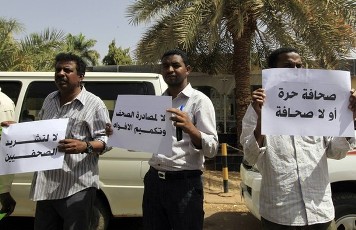Sudan security forces newspaper editor-in-chief to resign, detains Al-Jazeera bureau chief
April 3, 2013 (KHARTOUM) – Sudan’s National Intelligence and Security Services (NISS) today notified the Editor-in-chief of Al-Sahafa daily newspaper, Al-Nur Ahmed Al-Nur that he must resign his post and see that his name is removed from the paper’s letterhead.

Al-Nur served in this position at Al-Sahafa newspaper since 2007. He also works as a correspondent for the London–based al-Hayat newspaper.
Security authorities did not cite reasons for Al-Nur’s suspension, but the newspaper has recently came under enormous pressure in the form of pre-printing censorship and was barred from publishing news reports and articles critical of the ruling National Congress Party or the government.
Sudan officially ceased direct press censorship in 2009 but continues to suspend and confiscate newspapers as a way of retaliation if they report on a long list of issues considered sensitive.
Newspapers also complain that they continue to receive phone instructions, usually via text messages from the National Intelligence and Security Services (NISS), ordering them not to report on certain subjects.
Last year authorities suspended columnist Haidar Al-Makashfi who works for the same newspaper for 11 months and prohibited him from writing in any newspaper.
They also shut down three newspapers including the independent al-Tayar newspaper and two Islamist newspapers – Alwan and al-Rai al-Shaab.
Al-Nur said that his suspension is likely due to his clash with one of the security men on publishing news regarding the defense team assigned by the Islamic Movement for the coup attempt detainees, adding that authorities told him that he could continue writing in the newspaper but no longer as an editor-in-chief.
Authorities announced last November that they had arrested 13 suspects, including ex-spy chief Salah Gosh and Brigadier General Mohamed Ibrahim Abdel-Galil from the Sudanese Armed Forces (SAF), on suspicion of standing behind a “subversive attempt”.
Last month, the trial of military personnel accused of involvement in the attempt began amid intense secrecy.
A defense team comprising of Omer Abdalla Elshiekh, Hashim Abubakr Elgaali, and others has been formed.
Mekki Elmograbi, President of the non-governmental Sudan Press Freedom (SPF) told Sudan Tribune in an emailed statement that the NISS also summoned Al-Masalami Kabbashi, the Al-Jazeera bureau chief in Khartoum.
“They investigated him from morning to evening with some hours for break and prayers,” Elmograbi wrote.
“The authorities gave things with the right hand and took others with the left hand; they lifted the ban on writers Osman Shabouna and Ishag Fadl Allah, but still three journalists [remain] under the ban, today they banned the Editor of Al-Sahafa from his job” he added.
The crackdown comes days after Sudanese president Omer Hassan al-Bashir issued an amnesty on political prisoners which resulted in release of seven opposition figures and two ex-NISS officers arrested in connection with in last years’ coup attempt.
Bashir also hailed what he said was great freedoms enjoyed by the press in Sudan.
“On the media front and due to our conviction that the media is a vital partner we have allowed various media bodies ample room and high space to increase the coverage of radio and TV broadcasting. Radio FM stations increases and new satellite TV emerged and the number of newspapers increased” Bashir said at his speech before the national assembly this week.
“We have not banned any pen critical [of government] but only those who took advantage of the freedom for demolition, anarchy and crossing red lines” he added.
In 2010 Sudan suspended the broadcasts of the BBC Arabic on FM radio and also revoked license of Monte Carlo, the Arabic service of Radio France Internationale (RFI) which also used FM airwaves in Sudan.
In both decisions the government insisted that it was not linked to the contents of its reporting.
(ST)
